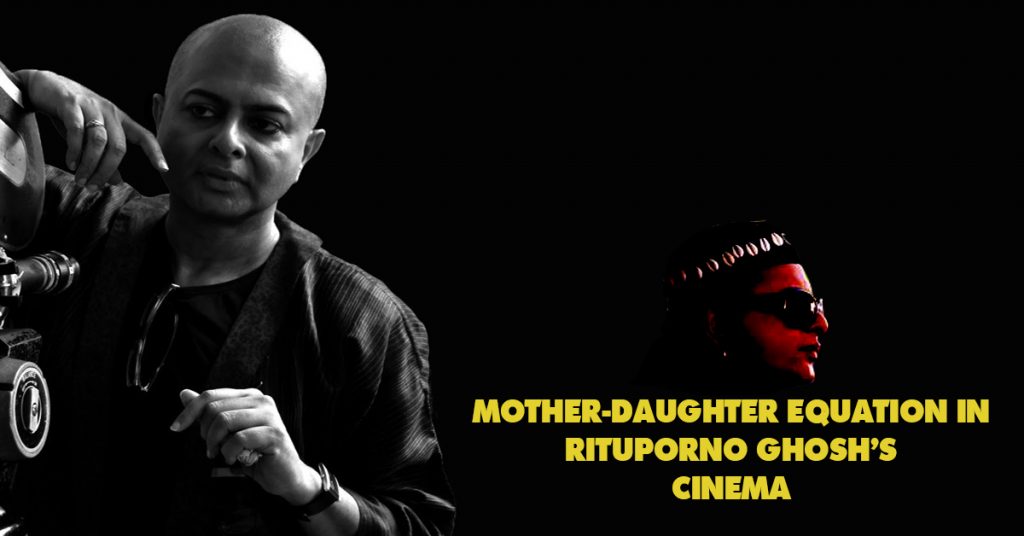Rituporno Ghosh is not just a name but an industry in itself. His creative brilliance lures through one screen to another. Commemorating his excellence in a small way through the context of mother and daughter.
Rituporno Ghosh and his exploration:
The Electra Complex is not an immediate antithesis to Oedipus Complex. Because the complexities in a woman are not surface-level. The intensity of human equations involving a woman is far layered and a lot more interesting because of the emotional investigation they attract. The twelve-time national award-winning Rituporno Ghosh (a soul that has gifted tranquillity on the celluloid, while dissecting complexity, is surely resting in peace), has managed to explore and express his searchings of the myriad of emotions involving a mother and her daughter.

Unishe April, the second feature film of Rituporno Ghosh and arguably the first of it’s kind to infuse a certain freshness needed in Bengali cinema at that time, and Titli, are two of his works that take viewers on a journey of the dynamic equation of rejection and acceptance between a mother and her daughter. In a predictable manner, Ghosh had taken the route oft’ travelled, the interjection of a male third person as the cause of the layered emotions, in both films. In the National Award-winning Unishe April, the man is the father of the daughter and husband to the mother but in contrast, in Titli, the man is a celebrated actor who provides infatuation material for the daughter and is a former lover of the mother.
Also Read: Singer Jojo: exploring her life in other ways
Rituporno Ghosh’s choice of the title, Unishe April is blanketed with cinematic paradox in the script itself. It is the day that the danseuse Sarojini, performed by Aparna Sen, will be honoured and she has forgotten that it is also the commemoration date of her late husband. Debashree Roy is aptly cast as the daughter, Aditi, who struggles to suppress her resentment towards the mother, recognising her mother’s glory as indifference towards the father.
Usually, a woman is expected to empathise with another. Here Ghosh has pitted the women against each other. The daughter’s inability to accept the mother’s ambition, devotion to her art and responsibility towards her students manifests into a volcanic eruption of bottled angst. What is interesting for a cinema connoisseur is to wonder if the emotions that surface during the 138 minutes is actually resulting from the attitude of the mother and daughter towards the father, or is it a mere excuse for the daughter, a doctor by profession, because of envy she harbours towards the successful mother.
 What appears to be a final nail to the coffin- in terms of the conflict between the mother and daughter, is the rejection of Aditi, as a prospective wife, by the Prosenjit Chatterjee’s essayed character in the film. When it is known that Sarojini is receiving a prestigious award the family members of Aditi’s prospective husband, refuse to accept the daughter of a public performer as the wife in the family. This film was released in 1994. I was in the eighth standard. Society, I remember, functioned bit different from how it did till March 25th, the virus-infected 2020.
What appears to be a final nail to the coffin- in terms of the conflict between the mother and daughter, is the rejection of Aditi, as a prospective wife, by the Prosenjit Chatterjee’s essayed character in the film. When it is known that Sarojini is receiving a prestigious award the family members of Aditi’s prospective husband, refuse to accept the daughter of a public performer as the wife in the family. This film was released in 1994. I was in the eighth standard. Society, I remember, functioned bit different from how it did till March 25th, the virus-infected 2020.
The COVID reference by me in this tribute is superficial and forced intermission point as we now move on to the next, Titli. Real-life mother-daughter dynamic duo of Aparna Sen and Konkona Sen play the reel life characters here. This is almost a decade later, the year 2002. Yash Chopra’s Lamhe is already a social reject but critics hail the film as futuristic in nature. Why am I even mentioning Lamhe, you might know if you still intend on reading this tribute.
Rituporno’s brilliant engagement of cinematic tools:
Rituporno Ghosh brilliantly engages all the tools available to a filmmaker. He borrows from Rajesh Khanna’s ‘Mere Sapnon Ke Rani’ to Shakti Chattopadhyay’s poem ‘Abani Bari Acho‘. He even incorporates Lenon’s ‘Strawberry Fields Forever‘ and never misses an opportunity to infuse Rabindranath. Ghosh does not stop at borrowing Literature. He paints his canvas with the scenic beauty of the route from Kurseong to Siliguri and is inspired by seasons and seasonal changes. And in the midst of cinematic brilliance, the core element of screenplay perfection, the true secret, of the success of any film, according to me, is met with panache.
Titli, the teenager is crushing on her matinee idol, the Bollywood superstar Rohit Roy. A masterstroke is delivered by the director as he plants Mithun Chakroborty in the lead. So we have award-winning actors Konkona, Aparna and Mithun along with Ghosh favourite Deepankar Dey.
Here the daughter considers the mother as a rival when she learns about the real-life romance between her mother, Urmila and the star. Her agony struggles to find expression. She feels cheated by her own mother. This is not an easy space that Ghosh tried to explore. Though the screenplay managed to stitch together the cinematic tools, the script in my humble opinion, was bit ambitious. This is where I feel, the much dated Lamhe, on almost similar plot, manages to retain a certain freshness even today. I feel in order to achieve the celluloid brilliance, Ghosh did not continue with the emotional curves the premise had to offer.
In both films, Rituparno Ghosh arrives at a justified conclusion. With a resolution. The resolution here is acceptance and appreciation. The mother and the daughter, in both premises, make their emotional adjustments and empathise with one another. There is a journey in the relationship and a certain maturity is attained by both. Ghosh creates a space for reconciliation and makes it possible for the characters to attain the maturity of acceptance. The reconciliation is not forced but a natural process.
The mother-daughter equation is fascinating and comparatively less explored. But it is real, almost tangible and layered. Thanks to the master maker for venturing in the route less travelled, using his canvas, in the manner only he could.





One Response